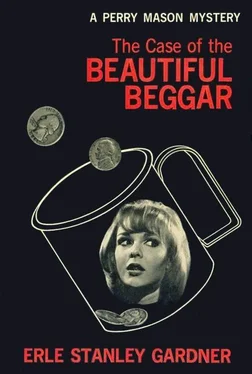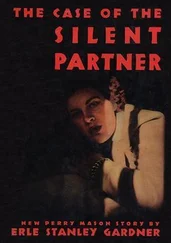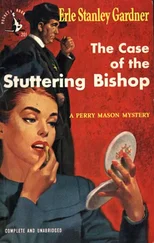“You!” she exclaimed. “How in the world did you get here?”
Mason said, “Daphne, I want to ask you some questions. I want you to be very careful how you answer them. Anything that you say to me is a privileged communication as long as only you. Della and I are in the room. But with Paul Drake, a detective, present, the communication is no longer privileged. Drake can be called as a witness. Now, if there are any questions I ask which are going to embarrass you, or anything you want to tell me which you don’t want known, just speak up and Paul Drake will either step outside or step into the bathroom. Is that clear?”
She nodded wordlessly.
“All right,” Mason said, “just what do you think you’re accomplishing?”
“I’m trying to save Uncle Horace’s sanity,” she said. “He would have gone stark, staring, raving mad if I hadn’t got him out of that place. Or did you know that I had got him out of the place?”
“I knew,” Mason said. “Why didn’t you tell me what you were intending to do?”
“I didn’t dare. I was afraid you would stop me.”
“Why?”
“Your ideas of professional ethics.”
Mason regarded her thoughtfully.
She said after a moment, “I presume you know all that I’ve done.”
Mason said, “You went out to the sanitarium. You saw from the sign that they were very anxious to get someone to do domestic work. You applied for the job.”
She nodded.
“You bought a new car.”
Again she nodded.
“All right,” Mason said, “you went out and went to work. What happened?”
She said, “I’ll never forget what I saw when I got out there. I started work. It took me a couple of hours before I dared to slip into Unit 17 where they were keeping Uncle Horace.
“There was that poor man strapped to a bed — absolutely strapped — and the straps were stretched so tight that they were holding him motionless.”
“What was his mental condition?”
“What would your mental condition be in a situation like that? Here the poor man had been taken away from his home, had been stripped of his property. And they intended to leave him there until he died, and to do everything they could to hasten his death.
“Uncle Horace has always had claustrophobia — a fear of being rendered helpless where he couldn’t move. And he was tied down there, he was moving his head and trying to get at his straps so he could bite them. He was wild and disheveled and—”
“Did he recognize you?” Mason asked.
She hesitated a moment and then said, “I don’t think I’d better talk any more about that phase of it until you and I can be alone, Mr. Mason.”
“All right,” Mason said. “What else can we talk about now?”
“Well,” she said, “I went back in the morning after the night’s work had all been done and just before the morning shift came on — right after the cook came in. I had picked up a very sharp butcher knife in the kitchen and I cut through those straps. I found Uncle Horace’s clothes in the closet and I got some clothes on him and got him out into the automobile and drove away.”
“Did you think they would follow you?”
“Yes.”
“Why didn’t you keep Uncle Horace here with you?”
“I thought it would be safer to park him off by himself.”
“Did he recognize you in the morning when you took him out?”
“Oh heavens, yes,” she said.
“What’s his mental condition now?”
“Pretty near normal, except when you mention something about the sanitarium he just goes all to pieces. He’s on the verge of a complete nervous breakdown because of the things he’s had to put up with.”
“You knew they’d find out about what you did?” Mason asked.
“I felt they probably would, yes.”
“You knew that they’d come looking for you?”
“That’s why I got Uncle Horace where no one could ever find him.”
Mason raised his eyebrows.
“No one will find him where he is,” she said. “He’s going to stay there until he’s got his nerves back in shape and until we can get Finchley shown up for the type of man he is.
“Uncle Horace tells me that no sooner had I left for the Orient than they started doing all sorts of little things that they knew would irritate and annoy him. They treated him like a child. They wouldn’t let him do what he wanted to. They started making him nervous. He thinks Aunt Elinor was giving him some drug that overstimulated him. He couldn’t sleep, and when he told her he couldn’t sleep, she said she’d give him some sleeping pills.
“Within a week or ten days, he was so dependent on those sleeping pills that he had to have them in order to get a night’s sleep. Otherwise he’d lie there and toss and get nervous, sleep for an hour or two, then lie awake for the rest of the night.”
“Didn’t it occur to him that Mrs. Finchley was deliberately drugging him?”
“Not at the time. She handed him a great line of talk about how he was upset because he was accustomed to having me around, but that the trip was the best thing on earth for me and that I was going to crack up if I didn’t have some recreation and some help. And she pointed out to him that he was pretty much of a nuisance and needed altogether too much attention for one person to give it to him. And then she kept giving him more and more medication.
“Finally, he realized what they were trying to do. That was when he wrote that letter to me.”
“Just what was his idea in writing that letter?”
“He wanted me to get enough money out of the bank account so that if they did start proceedings for a guardianship, he wouldn’t be absolutely helpless.”
“He realized what they had in mind?”
“By that time, yes it was very obvious... That’s a horrible thing, Mr. Mason. They suddenly drag a man into court and claim that he’s incompetent to manage his affairs and strip him of every cent he has in the world.
“How would you feel if you’d saved up enough money to be independent, and then relatives suddenly moved in and took all that money away from you and put you in some kind of an institution where—”
“I’d feel pretty bad,” Mason said, “but that’s not the point. Just what are your plans now?”
“I was intending to get in touch with you.”
“You took long enough doing it.”
“Well, I had to make arrangements to see that Uncle Horace would be safe and comfortable.”
“Where is he?”
She clamped her lips together and shook her head.
Mason smiled. “You’re not telling me?”
“No. I’m not going to tell a soul. That’s why I have him where people can’t get at him until he’s ready to step into court and go in there fighting. And this time, he’s not going to be drugged.”
“He was drugged when he went to court?” Mason asked.
“Of course,” she said scornfully. “You don’t think that they could ever have pulled a fast one like that unless they had him drugged in such a way that he didn’t have his normal responses.”
“The judge didn’t detect that he was drugged and the doctor that examined him didn’t.”
“They were rather clever but they had been brainwashing him for three months. Don’t ever forget that! And with a man of that age, a very clever person can do a lot of brainwashing in three months.”
“How is he now?” Mason asked.
She hesitated for a moment, then said, “Better.”
“And you gave him money?” Mason asked.
“I gave him forty thousand dollars of his money.”
“Forty thousand dollars?” Mason asked.
She nodded. “I bought the car, and I’m keeping enough money so I can do the things that have to be done. I gave him the rest.”
Читать дальше












